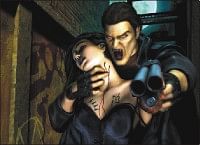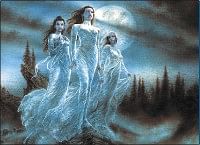Vampires
& Witches
By
Sabrina F Ahmed
 SINCE
the establishment of primitive societies and the birth of crude religions,
humans have been fascinated with the occult, and forces beyond their
control. The eternal clash between 'good' and 'evil', has been a subject
of many debates and discussions; religions have been created to deal
with it, and reams of literature has been written to deal with the
concept. It is human nature to try and stretch their limits, and to
attempt to take on and master forces greater than themselves, and
when they can't do it in reality, they try and achieve the impossible
through art. Sounds unlikely? This theory could explain why shows
like Buffy the Vampire Slayer, Angel and Charmed have gained cult
status amongst TV viewers today.
SINCE
the establishment of primitive societies and the birth of crude religions,
humans have been fascinated with the occult, and forces beyond their
control. The eternal clash between 'good' and 'evil', has been a subject
of many debates and discussions; religions have been created to deal
with it, and reams of literature has been written to deal with the
concept. It is human nature to try and stretch their limits, and to
attempt to take on and master forces greater than themselves, and
when they can't do it in reality, they try and achieve the impossible
through art. Sounds unlikely? This theory could explain why shows
like Buffy the Vampire Slayer, Angel and Charmed have gained cult
status amongst TV viewers today.
Of course, a good portion of the entertainment comes
from the sex appeal of the characters, and factors like the cool fight
sequences, and the special effects, and also the elements of fantasy.
There's more to it, though. A number of modern programmes like these
have many cult viewers and it is worth thinking about the relationship
between television shows and their cult audiences.
Broadly there are two very different views about what
it means to be in a television cult. The first centers on the way
that these audiences decode the media texts. If you look on the Internet
at the many discussion groups that are made up of conversation about
the shows, you will see that their discussions range much wider than
"just" talking about the series. The show quickly becomes
a springboard for general discussions among a group with a shared
interest. There is also something about the programmes that has spurred
these people on- something that they can associate with enough to
want to spend their time sharing their personal lives with like-minded
people. It could be the characters in the show, or the concept behind
the show…or even the situations presented in each episode. The programme
becomes something the fans can use as a tool to measure their own
lives and make value judgements about the world around them. A long
way from just talking geekily about vampires and witches.
Members of a television cult take their fascination
way beyond any level that the original producers of the show could
ever have guessed. Their act of decoding the messages of the show
is highly creative- they are coming up with their own interpretations
and meanings for events and relating what they see in the show to
the concerns of their own lives and the interests of their gender.
So let us take a closer look at three shows which as an example of
the way prime-time television has made a huge impact on the lives
of thousands of viewers worldwide:
Buffy the Vampire Slayer: In 1992 Kristy Swanson starred
in the role of Buffy in the lukewarm feature film version of Buffy
the Vampire Slayer. Creator Joss Whedon probably had had no idea that
a few short years later his beloved character would be starring in
one of the most simultaneously acclaimed and smirked at television
series of the 1990s. Buffy The Vampire Slayer, is the story of a sexy
Valley Girl who learns she is the latest in a long line of Slayers,
selected to rid the world of the vampire menace. Her job, plain and
simple, is to kill vampires, whether she wants to or not. Whedon created
an interesting storyline, but the film, directed by Fran Kuzui, veered
all over the road, and aside from a pair of fun performances by Swanson
and Paul Reubens as vampire Amilyn, it was basically a mixed-up bag
of tricks that never amounted to all that much, critically.
Flash forward to 1997, and a mid-season replacement
on the WB network finds Whedon controlling a genre-busting new series
based on Buffy, and the vampire world would just never be the same
again. With obvious parallels between high school and Hell, Whedon
ironed out the unevenness of the film version. In the years since
the BtVS series debuted, he has continually blended a clever mix of
witty, natural dialogue with out-of-the-world storylines that would
cause some eye-rolling, were it not for the excellent, tongue-in-cheek
writing. Let's not forget all those cool monsters, vampires and beasties.
 The
show's creator Joss Whedon says: "The first thing I ever thought
of when I thought of Buffy: The Movie was the little...blonde girl
who goes into a dark alley and gets killed, in every horror movie.
The idea of Buffy was to subvert that idea, that image, and create
someone who was a hero where she had always been a victim. That element
of surprise...[and] genre busting is very much at the heart of both
the movie and the series... In the credits, where it starts out with
this scary organ, and then devolves instantly into rock n' roll, which
is basically trying to tell people exactly what the show is, in the
credits, which is, here's a girl who has no patience for a horror
movie, who is not willing to be the victim... She's gonna bring her
own sort of youth and rockin' attitude to it." So she does. The
able Sarah Michelle Gellar plays the lead character Buffy. Gorgeous.
Strong. Lonely. Funny. Misunderstood. Like the opening narration says,
she IS the Slayer, and there are few things more enjoyable than seeing
her fire a crossbow or wield a stake. She keeps the character tightly
wound, and plays it rather low key and deadpan. Gellar gives Buffy
more of a dramatic edge than her predecessor Swanson did. Let's not
forget the rest of the brilliant cast…the 'Scoobies': Willow (Alyson
Hannigan), Xander (Nicholas Brendan), her watcher, Giles (Anthony
Stewart Head), and in the later seasons, the scrumptious Spike (James
Marsters). Although the series has gone into its final season, its
impact on its viewers cannot be ignored.
The
show's creator Joss Whedon says: "The first thing I ever thought
of when I thought of Buffy: The Movie was the little...blonde girl
who goes into a dark alley and gets killed, in every horror movie.
The idea of Buffy was to subvert that idea, that image, and create
someone who was a hero where she had always been a victim. That element
of surprise...[and] genre busting is very much at the heart of both
the movie and the series... In the credits, where it starts out with
this scary organ, and then devolves instantly into rock n' roll, which
is basically trying to tell people exactly what the show is, in the
credits, which is, here's a girl who has no patience for a horror
movie, who is not willing to be the victim... She's gonna bring her
own sort of youth and rockin' attitude to it." So she does. The
able Sarah Michelle Gellar plays the lead character Buffy. Gorgeous.
Strong. Lonely. Funny. Misunderstood. Like the opening narration says,
she IS the Slayer, and there are few things more enjoyable than seeing
her fire a crossbow or wield a stake. She keeps the character tightly
wound, and plays it rather low key and deadpan. Gellar gives Buffy
more of a dramatic edge than her predecessor Swanson did. Let's not
forget the rest of the brilliant cast…the 'Scoobies': Willow (Alyson
Hannigan), Xander (Nicholas Brendan), her watcher, Giles (Anthony
Stewart Head), and in the later seasons, the scrumptious Spike (James
Marsters). Although the series has gone into its final season, its
impact on its viewers cannot be ignored.
Angel: This Buffy spin-off, quickly catapulted towards
fame shortly after its release, and for a while even overshadowed
its parent series. The series details the ongoing trials of the vampire
Angel, who had his human soul restored to him as a punishment after
two centuries of murder and torture of innocents, leaving him tormented
by remorse.
He works as a private detective in a fictionalized
version of Los Angeles, California, where he and a variety of associates
work to "help the helpless" and to restore the faith and
"save the souls" of those who have lost their way. Typically
this involves doing battle with evil demons (which, on Angel, are
distinguished from well-meaning, neutral and innocent demons) as well
as tangling with demonically allied humans and his own violent nature.
The original concept for the series was a dramatic
modernization of the classical noir detective story, which gained
popularity in large part through the works of Raymond Chandler. In
much the same way as Buffy had been a recreation of classical horror
films, Angel gave the same treatment to the classical Film noir. The
character of Angel was developed here as a recreation of the reluctant,
hard-boiled Los Angeles detective who has dealings with a variety
of underworld characters. In this case, the "underworld"
is a more literal underworld of demons and supernatural beings.
The series has also mirrored Buffy in attaching itself
to a higher overarching theme. Where Buffy used supernatural elements
as a metaphor for personal issues in adolescence, Angel has employed
the same kinds of metaphors to explore higher spiritual and moral
issues. The central theme of the series has been the prota-gonist's
quest for redemption. Just as Buffy was intended to capture a sense
of the suburban oppression experienced by many teens, Angel has made
much use of the feelings of loneliness, danger and callousness often
attributed to ultra-urban Los Angeles. The divisions between the ordered
world of the day and the chaotic world of the night have been trademark
themes of noir and by drawing a protagonist who literally has no daytime
life, the series has been able to explore these same themes in more
dramatic metaphorical ways. The studly David Boreanaz, who is at his
brooding best, plays the character of Angel the vampire. As well as
a whole cast of new characters, the series also features the lovely
Charisma Carpenter, who plays the role of the snooty Cordelia in the
earlier Buffy episodes. Rumors have it that once the Buffy series
ends, James Marsters, who's put in a few cameo appearances as Spike,
will become a permanent fixture in Angel. I for one, can't wait.
Charmed: The most recent addition to Star World's
list of fantasy-themed shows. A supernatural one-hour drama from Spelling
Television, Charmed chronicles the conflicts and the love among three
vastly different sisters and their need to come together to fulfill
an ancient witchcraft prophecy. As the series enters its sixth season,
the Charmed Ones are stronger and more united than before.
The Halliwell sisters were always different, not just
from the world around them, but also from each other. Though bound
together by blood and destiny, these twenty-something women could
not have been more dissimilar. Yet the discovery that the three sisters
were powerful good witches, foretold as the Charmed Ones, created
a bond that reached far beyond petty sisterly grudges, and they banded
together to keep their otherworldly witchcraft a secret and vanquish
all comers.
Each sister has her own unique set of powers, which
are constantly evolving. Phoebe (Alyssa Milano), who has premonitions
and the ability to levitate, finds new power as an empath in the sixth
season. Her newfound ability to feel what others are feeling will
prove extremely useful. New mother Piper (Holly Marie Combs) can freeze
time and cause explosions. Newest to the Halliwell fold, Paige (Rose
McGowan) was raised by adoptive parents and always felt that there
was something different about her. In the search for her birth parents,
she learned that she was abandoned at a local church as an infant,
the result of a clandestine love between Phoebe and Piper's mother
and a Whitelighter guardian angel. This ancestry and the unexpected
death of the oldest Halliwell sister, Prue (Shannen Doherty), resulted
in the awakening of Paige's powers to move things with her mind and
to "orb" in and out between planes. Paige's more experienced
sisters help her harness the power in their battle against evil. Still,
Paige has not yet come to grips with witchcraft, and she will take
on a series of temporary jobs this season in her search to find not
only a career, but also her true purpose in life.
Other than an interesting storyline, compelling emotional
scenes and great fight sequences, not to mention all the magic and
special effects, this series also has a good babe factor. Other than
the gorgeous Charmed Ones themselves, there's the delectable Daryl
Morris (Dorian Gregory) the Charmed Ones' link to the police, and
of course Cole Turner (Julian McMahon), Phoebe's demon/half ex-husband.
On the whole the series is lighter and funnier than either Angel or
Buffy, and definitely more emotional.
There
you have it folks; the low-down on the shows that leave you spell-bound.
Now if you'll excuse me, I better go and grab the remote…Angel's due
any minute.
